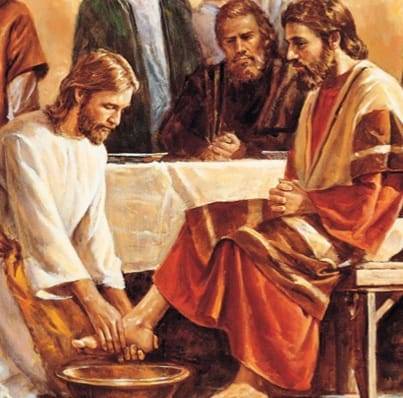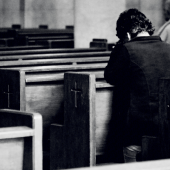Reflection on Holy Thursday

As we commemorate Jesus' Last Supper with his disciples our attention usually focuses on the Eucharist and the Priesthood.
Scholastic theologians in the middle ages point to the Last Supper as the moment when Jesus "instituted" the sacraments of the Eucharist and the Priesthood. For these theologians, sacramental theology requires that each of the seven sacraments must have been instituted by Christ himself at some moment in his ministry (e.g. baptism in the river Jordan, marriage at Cana, etc.).
Thus, at the Last Supper when Christ offered the bread and wine and pronounced the words of institution "this is my body...this is my blood" the sacraments of the Eucharist and the Priesthood were duly instituted.
This presupposes that the essence of the Eucharist is the transubstantiation when bread and wine become the body and blood of Christ and the essence of the priesthood is exercising the power received in ordination to make this transubstantiation possible. This theological construct makes sense.
However, after many centuries of development in biblical scholarship and theologizing questions have been raised about the narrow scholastic interpretation which in the minds of many has gained the status of dogma.
The question of historicity arises: did Jesus intend to institute the sacraments of the Eucharist and the Priesthood? The gospel accounts do not explicitly say that. We were not there nor are we privy to what Jesus was thinking.
The question also arises if it is essential for Jesus to "institute" the sacraments for these to be valid.
The fundamental questions about the Eucharist: what does it mean and signify? Can it be reduced to the re-enactment of the Last Supper and pronouncing the words of consecration? There is more to the Eucharist than the act of consecration. We celebrate, as a community and part of the Body of Christ, our communion with Christ and with one another who is present in our midst, in the Word that is proclaimed, and in the consecrated bread and wine which we share. This communion that we celebrate is to be lived in our day-to-day life.
The fundamental question about the ministerial priesthood: can it be reduced to the celebration of the Eucharist? There is more to priestly ministry than sacramental-liturgical celebration (e.g. pastoral, prophetic, and social action). Ordained priests are servant leaders of the prophetic-evangelizing, priestly-worshipping, and servant community.
We need to deepen and broaden our understanding of the Eucharist and the ministerial priesthood. We need to explore the meaning and significance of the Last Supper. In doing so, we have to avoid clericalism. We can start by refraining to call today "priest's day" or "Father's Day."
Holy Thursday and the Last Supper are all about Jesus giving meaning to his whole life and his death on the cross.
The washing of the feet signifies a life of humble and loving service fully manifested in his death on the cross. The bread and wine signify his body and blood - his total self- sacrificed on the cross. "Do this in memory" does not mean simply celebrating the Eucharist constantly. It also means offering our body and blood - our whole life - in loving service to God and his people.
This requires our readiness to follow the way of the cross, to embrace martyrdom. This is not just for priests but for all we baptized Christians called discipleship and servanthood. - Father Amado L. Picardal, CSsR
Radio Veritas Asia (RVA), a media platform of the Catholic Church, aims to share Christ. RVA started in 1969 as a continental Catholic radio station to serve Asian countries in their respective local language, thus earning the tag “the Voice of Asian Christianity.” Responding to the emerging context, RVA embraced media platforms to connect with the global Asian audience via its 21 language websites and various social media platforms.














